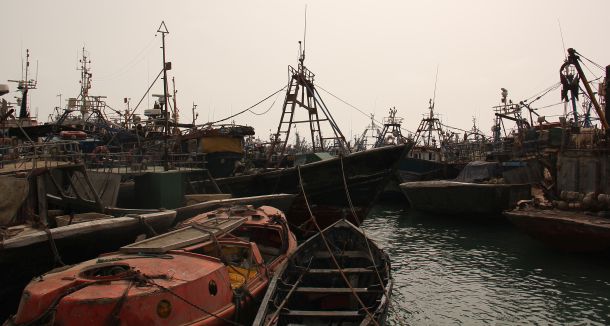The United Kingdom was the prime exporter of gas into occupied Western Sahara in 2020.
Video above: The gas that arrived to Western Sahara in 2020 to a large extent came from Northern Europe. The shipment in the video was from Norway.
Eleven shipments of liquified butane gas were delivered to ports in occupied Western Sahara in 2020. While Spain dominated the list in 2019, the United Kingdom overtook Western Sahara's old colonial power as the prime exporter in 2020.
For the second time, Western Sahara Resource Watch (WSRW) presents a detailed overview of such shipments into Western Sahara. Our surveillance of shipment traffic shows that during the calendar year of 2020, a total of 11 so-called LPG tankers arrived at the port of El Aaiún.
Of these, five came from the UK ports of Immingham and Teesside. WSRW estimates that an approximate 22,000 tonnes came from the UK - out of a total of perhaps 51,000 tonnes into the territory.
The total volume of imports are the same as in 2019, when WSRW for the first time made such a study.
Morocco does not produce gas but is, according to Index Mundi, a top-tier importer and consumer of butane gas. Much of that gas is spent fueling the machinery of occupation in Western Sahara. The gas is imported to uphold critical infrastructure and industries for its illegal occupation.
The imported gas enters the territory on tanker ships specifically made to transport liquified gas (LPG).
The gas was delivered from terminals exclusively located in Europe, but onboard tanker ships registered much farther afield; Singapore, Malta, Liberia, Marshall Islands and Panama. The imports from Northern Europe was a new trend in 2020, whereas it has in the past generally been originating in Southern Europe.
There could have been a twelfth shipment. Following protests from civil society and exposure in the Norwegian financial press, a tanker from Kårstø in Norway was diverted at the last minute. The Marshall Islands-registered Eco Invictus was set to call in Western Sahara in early June with approximately 4,900 tonnes of butane. Choosing to avoid further public scrutiny, the exporter eventually rerouted the tanker to the Moroccan port of Mohammedia instead.
The Eco Invictus incident came a mere two months after Norwegian energy giant Equinor (formerly Statoil) publicly 'regretted' an earlier shipment of gas to Western Sahara and promised never to do it again.
Similarly, after being pressured by Austrian and international solidarity NGOs after a gas shipment from Sweden was exposed, the Austrian chemical giant Borealis expressed in May that they would never again take part in such exports.
The ten butane tankers involved in the eleven shipments in 2020 are; Gas Cerberus, Eco Nemesis, JS Lekvar, Epic Beata, Epic Borinquen, Epic Bermuda, Epic Bird, Epic Barbados, Epic Madeira, Epic Manhattan. The list below only shows the port that the gas was exported from, but doesn't reflect the actual origin of the gas.
Two shipping companies are behind 10 of the 11 shipments: Norwegian-controlled Epic Gas and the Greek company Stealth Corp. The former company is controlled by BW Group, a company that the Norwegian Support Committee for Western Sahara first wrote on 24 November 2020, and then again on 24 December 2020, 7 January 2021 and 30 May 2021. Stealth Corp was contacted on 25 April 2020 and 5 June 2020. None of the letters have been responded to.
Estimations of each vessel's cargo is based on how full they seemingly were when entering Western Sahara waters, and whether the vessels made stops on their way from the gas export terminal to Western Sahara.
In 2014, WSRW authored the report Fuelling the occupation on the Swedish company Wisby Tankers' transports of petroleum products into the occupied territory. In 2020, WSRW also published a separate overview of imports of petroleum products for the calendar year 2019.

First overview of gas imports into occupied Western Sahara
50,000 tonnes of liquified gas arrived in occupied Western Sahara last year, according to our first overview of this key trade.
New report: Western Sahara phosphate trade halved
The export of phosphate rock from occupied Western Sahara has never been lower than in 2019. This is revealed in the new WSRW report P for Plunder, published today.
CGG blames Shell for Saharawi survey
A French-Norwegian seismic survey vessel has entered Saharawi waters four times. The company behind the exploration blames its Dutch client.
New report on Western Sahara phosphate industry out now
Morocco shipped 1.93 million tonnes of phosphate out of occupied Western Sahara in 2018, worth an estimated $164 million, new report shows. Here is all you need to know about the volume, values, vessels and clients.



